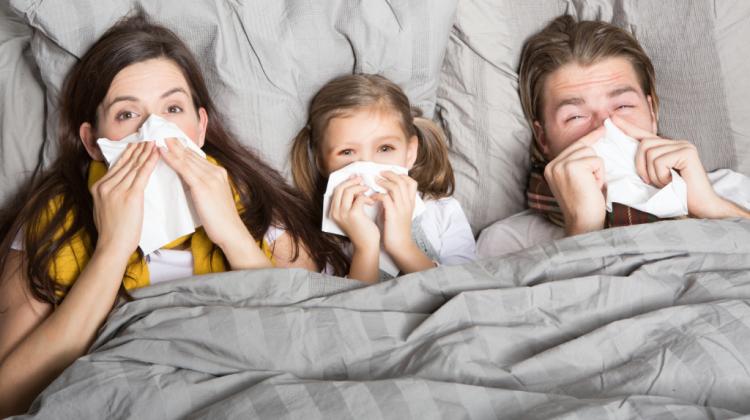Expert: Medicalisation is being noticed by society
 Photo: Fotolia
Photo: Fotolia
90 percent residents of the Łódź province recognize that more and more conditions are defined as diseases. In disease, every fifth respondent expects special treatment from the environment. Women feel sick more often, but they less often count on special treatment - according to a study by the Medical University of Lodz.
These are the results of the study of knowledge and opinions of the residents of Łódź and the Łódź region on the subject of medicalisation, conducted by Dr. Magdalena Wieczorkowska, head of the Department of Sociology of the Medical University of Lodz.
"My research shows that as many as 90 percent respondents recognize that the media devote a lot more time to the problems of health and disease than a dozen years ago. They also notice greater impact of medicine on our lives than in previous decades" - said the sociologist.
Medicalisation is a manifestation of the growing influence of medicine on our lives. According to Dr. Wieczorkowska, it may take the form of pathologisation, when we start treating a given condition, phenomenon or behaviour as sickness. "Something that has been treated as normal behaviour, or a natural life process, suddenly begins to be treated as a medical pathology, it becomes a disorder, a syndrome, and it is treated" - she added.
Another manifestation of the medicalisation of social life is the supervision and monitoring of society through various types of indicators or measures. "A simple example - when we do blood tests, we are given reference standards, which tell us whether we fit within them or not. As we exceed the norm, we are defined as sick and subjected to treatment" - she said.
The third dimension of medicalisation is the improvement and treatment of healthy people as a potential group of patients, clients of medical facilities in order to make them even healthier. In this case, plastic surgery may serve as an example.
"Plastic surgery is not always a repair surgery, used to correct something that has been changed due to illness or accident. It increasingly becomes a surgery to fulfil desires. People use it because they find defects in themselves, while still being healthy people in the objective definitions. In other words - those people want to be even healthier, want to improve themselves" - explained the sociologist.
According to her, medicalization can be initiated from the bottom up and from the top down. In the early model of medicalisation, it was mainly initiated from the top: it was mainly doctors that could clearly say that a given person was ill and give them a label of a sick person. Now, the new model draws attention to the so-called new actors of medicalisation, which include patients themselves organizing themselves, for example, into interest groups and demanding recognition of a given state as a disease.
"These may be social movements, various associations and organizations, but the media and pharmaceutical companies play a significant role at the moment. There is even talk (...) about the additional process of pharmaceuticalisation, that is, making something a medical condition, but also indicating that there is a pharmacological solution to this problem" - she noted.
The expert carried out research on the knowledge and opinions of the residents of Łódź and the Łódź province on the subject of medicalisation. As she admitted, she was primarily interested in how the subjects perceive the process, whether it is visible and whether it functions in the social consciousness.
Research shows that as many as 90 percent respondents believe that nowadays an increase in conditions defined as diseases is observed. The same group notices that the media devote much more time to the problems of health and diseases than a dozen years ago. The respondents also notice greater impact of medicine on our lives than in previous decades. 90 percent respondents also feel responsible for their own health.
In the case of a disease 21 percent respondents expect special treatment from the environment. Women more often feel ill but less often expect special treatment. 70 percent respondents admitted that they were using illness as an excuse to avoid doing their household duties. There are those who do not go to work or cancel meetings with friends.
"In a medicalised society it is easier to accept sickness than laziness or lack of skills. Therefore, we are more likely to reach for the health argument, even if it is not real. +I did not do that because I was sick+ sounds better than +I did not do that because I did not want to+- emphasised Dr. Wieczorkowska.
The respondents were also given a list of a dozen conditions and asked to respond if they considered them diseases. 85 percent respondents considered ADHD a disease, and 30 percent indicated that social phobia was also a disease. Every fifth respondent included baldness in men among illnesses, 10 percent included homosexuality, and 6 percent - shyness.
"The study deliberately used objectively existing diseases, as well as +controversial+ conditions such as baldness and shyness, as well as an unmedicalised state - homosexuality, which was treated as a disease until 1973. It was later removed from the list of diseases and is now defined as an alternative lifestyle. Nevertheless, there is a percentage of the population in whose consciousness these problems actually function as objective diseases" - concluded Dr. Wieczorkowska.
PAP - Science in Poland
szu/ ekr/ kap/
tr. RL
Przed dodaniem komentarza prosimy o zapoznanie z Regulaminem forum serwisu Nauka w Polsce.















